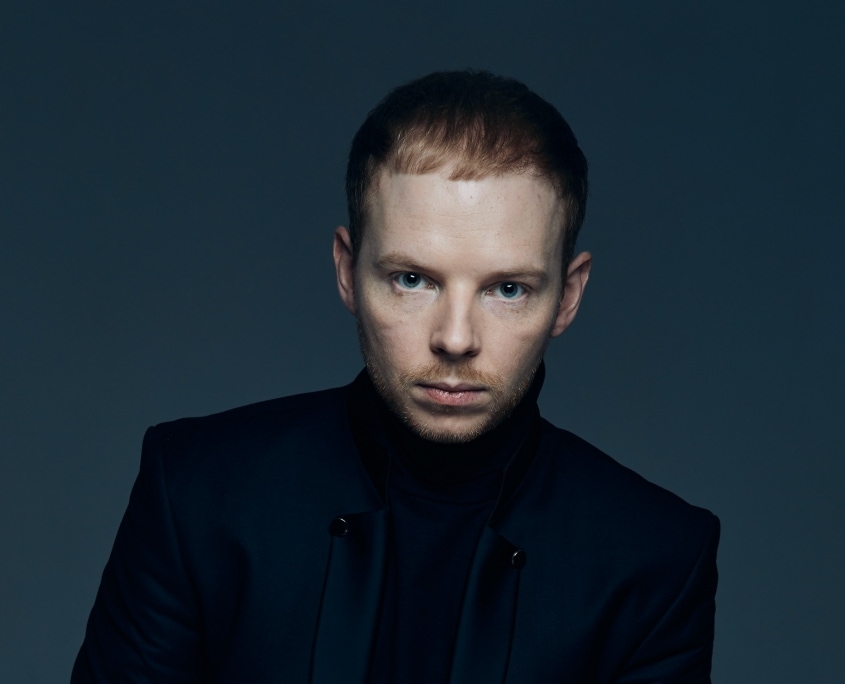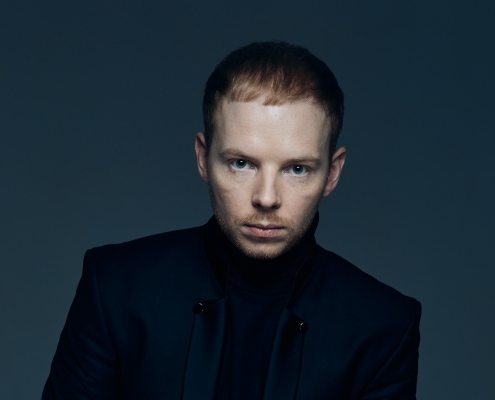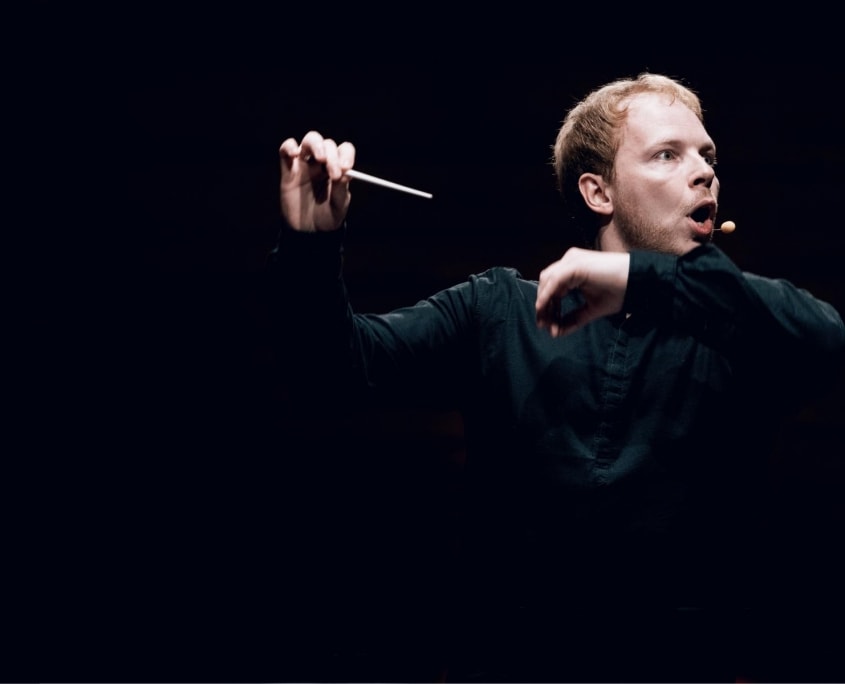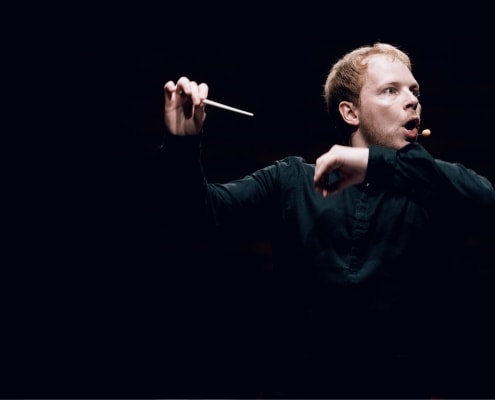Dmitry Matvienko : “Distruggere non è costruire”
Nato a Minsk nel 1990 Dmitry Matvienko si è aggiudicato il Primo Premio e il Premio del Pubblico all’ultima edizione della Malko Competition di Copenhagen, il più prestigioso tra i concorsi internazionali per giovani direttori d’orchestra, dopo essersi classificato terzo e aver vinto il Premio della Critica al “Cantelli” di Novara nel 2020. Gli abbiamo rivolto qualche domanda.
- La sua biografia non è quella – per fortuna – di un énfant prodige, ma invece rispecchia studi tenaci che partono da un talento e doti naturali indiscutibili ma coltivate nel tempo e con i maestri giusti. Si riconosce in questo?
Sì, si adatta perfettamente alla mia storia. Ho avuto un lungo e strano percorso per diventare direttore d’orchestra, anche se l’idea di diventare direttore d’orchestra è nata molto presto, intorno ai 9 o 10 anni, quando ho visto accidentalmente una registrazione di Valery Gergiev che dirigeva il Poema dell’Estasi di Skrjabin e dava un masterclass per giovani direttori d’orchestra. Ero stupito di come una persona possa influenzare la musica attraverso i suoi gesti ed espressioni facciali, e quali bei dettagli musicali riusciva a trasmettere. Sembrava davvero magico. Sono passati molti anni da allora, ma penso ancora che questa professione sia completamente magica e misterioso. Anche Rimsky-Korsakov ha detto che “dirigere è un mestiere oscuro”, e questo è assolutamente vero.
- Quanto è difficile per un direttore giovane imporsi? E qual è il rapporto con compagini orchestrali non formate esattamente da coetanei ma da musicisti che hanno molti anni di “abitudini” non sempre tutte buone?
È una domanda molto bella e difficile! Diverse volte nella mia pratica ci sono stati davvero problemi di questo tipo e me ne preoccupavo molto. Infatti, il problema dei giovani direttori d’orchestra e musicisti d’orchestra esperti che sono abituati a suonare in un certo modo, c’è. ho ricavato la seguente formula per me: quando incontri per la prima volta l’orchestra devi dare loro quello che loro vogliono. Devi conquistare la loro fiducia, e poi puoi suggerire gradualmente le tue idee, ma non all’inizio. Questo è l’errore di fondo dei giovani direttori che vogliono fare una rivoluzione dal primo secondo. Ovviamente è una sorta di compromesso, ma queste sono le regole del gioco. Sai, in Russia diciamo: “Distruggere non è costruire”. Posso capire i musicisti che hanno suonato di le sinfonie di Brahms con Chelibidache per un quarto di secolo, e poi arriva un giovane ragazzo e inizia a insegnare loro la vita. No, questo è l’approccio sbagliato. Devi rispettare e onorare le tradizioni dell’ensemble, mostrare una sottile diplomazia, e poi le persone si apriranno a te e potrai creare qualcosa di bello. È così che funziona.
- In Italia si è classificato al terzo posto del rinato Premio Cantelli, vincendo però il Premio della Critica. Qualche rimpianto?
Nessun rimpianto. Ricordo questa competizione solo con i sentimenti più affettuosi. Ho incontrato tante persone meravigliose e la fantastica Orchestra del Teatro Regio di Torino, con cui ci incontreremo ancora a dicembre su invito del caro Sebastian Schwartz (Direttore Artistico). Il Premio della Critica è un premio importante per me. Allora non avevo lavorato così spesso con orchestre europee, e in Italia era la mia prima volta, quindi sono stato molto felice di sentire da sentire parole tanto lusinghiere nei miei confronti da parte di persone così rispettate in questo settore.
- È freschissimo vincitore della Malko Competition, ovvero del concorso per direttori d’orchestra più importante d’Europa. Che responsabilità comporta e quali percorsi apre nella carriera di un giovane direttore?
Certo, è stato un momento molto felice della mia vita, una vera festa. Venivo da un lungo percorso e per un po’ di tempo dopo la gara non riuscivo a capire cosa fosse successo. Quando finalmente l’ho capito, ho realizzato che solo ora tutto avrà inizio. Questo è in realtà il primo passo verso una vera vita musicale professionale. La competizione dà davvero una grande spinta alla tua carriera. Un enorme numero di nuovi contatti, concerti e opportunità. Puoi pensare alla strategia, al repertorio, per pianificare la tua vita per diversi anni a venire. Quasi tutti i giovani direttori colgono ogni occasione per lavorare con un’orchestra, dirigere tutto, spesso musica che non gli piace o che non gli si addice. In questo senso, la competizione aiuta a focalizzare l’attenzione su di te e così puoi costruire la tua carriera in modo più ponderato e produttivo. Certo, la responsabilità è enorme. A un certo punto ti stanno invitando orchestre di altissimo livello che prima potevi solo sognare, ed è molto importante calcolare tutto e non accettare su tutto in una volta, altrimenti puoi commettere errori irreversibili. Mi aiutano il mio agente e Fabio Luisi, che è diventato il mio mentore dopo la competizione (uno dei premi per il primo posto).
- Tra le sue caratteristiche principali – ascoltando e guardando alcune sue prove – noto, oltre alla chiarezza estrema del gesto, tra l’altro con una mano sinistra di rara espressività, un approccio alla pagina improntato alla ricerca della verità del suono. Sbaglio?
Se l’ha notato, allora mi rassicura che non sto facendo la mia professione per niente. Faccio davvero molta attenzione a questi aspetti. Ho avuto insegnanti meravigliosi e colleghi più anziani che mi hanno aiutato e tuttora mi aiutano a formare la comprensione dell’interazione con la musica, degli stili e delle tradizioni. Io parto come direttore di coro, e per molto tempo ho cantato nei migliori cori in Russia, incluso il coro MusicaEterna di Teodor Currentzis. Fu una delle mie maggiori influenze all’epoca. Quando ero studente al Conservatorio di Mosca con il famoso professore Ponkin, ho incontrato anche Vladimir Jurowski, che mi ha influenzato molto e continua a farlo. L’ho assistito più volte in concerti e nell’opera. La prossima stagione mi ha invitato ad assisterlo nell’opera di Shostakovich “Il naso”, con la regia di Kirill Serebrennikov.
- Scorrendo il suo repertorio si scoprono scelte tutt’altro che convenzionali, penso anche alle prime esecuzioni di lavori contemporanei. Quanto è importante per un direttore la curiosità?
Sono sicuro che una qualità obbligatoria per un direttore d’orchestra sia quella di essere sempre affamato di cose nuove: nuovi compositori, opere mai suonate, nuove tecniche musicali, nuove sonorità, nuove scoperte. Una delle funzioni più importanti per un direttore, o se si vuole, la missione, è l’educazione, soprattutto nel 21° secolo, quando il livello delle orchestre è così alto che i musicisti non hanno bisogno di un direttore, in quanto persona che li aiuti ad imparare il materiale musicale e suonare l’intera sinfonia. Il direttore aiuta a scoprire nuovi nomi per il mondo ed è anche la guida principale per i compositori.
- Al secondo e terzo posto al Malko troviamo due direttrici a loro volta parecchio interessanti. È giunto il momento di considerare la direzione d’orchestra una questione di genere?
È interessante che mi venga posta questa domanda in tutte le mie interviste. Penso che la popolarità delle donne direttrici sia ora nella sua seconda fase. La prima fase è stata quando le donne sono entrate intenzionalmente e anche deliberatamente nella professione nel tentativo di dimostrare che potevano dimostrarsi allo stesso livello degli uomini. Era una reazione normale alla lunga discriminazione nella professione. In quel momento c’era un numero enorme di direttori femminili in tutti i concorsi, corsi di perfezionamento e sale da concerto. Certo, c’era una grande parte di lealtà e nozione di uguaglianza di genere in tutto questo, ma alla fine ha avuto i suoi risultati. Al concorso Malko ho visto meravigliose direttrici che hanno tutte le qualità e le conoscenze necessarie per lavorare con orchestre di altissimo livello. Qualcuno potrebbe dire che è piuttosto un’eccezione alle regole e in generale non è una professione da donna. Io rispondo che la professione del direttore in genere non è da tutti. Il direttore è una merce molto speciale. Se ascolto una bella esecuzione di una delle mie pagine preferite, non mi interessa di che genere sia il musicista. Il talento non ha genere.
- I suoi impegni futuri?
Uno dei premi del concorso Malko: 24 concerti con orchestre di tutto il mondo. Dato che il concorso si è svolto a giugno e tutte le orchestre avevano già predisposto un programma per la stagione e anche io non avevo tante date libere, ma siamo riusciti a inserire qualcosa.
A settembre farò un concerto a Genova con l’orchestra del Carlo Felice, ad aprile un concerto a
Bergen, a maggio un concerto con l’orchestra sinfonica di Sydney, a settembre 2022 un concerto con l’orchestra sinfonica nazionale danese, a ottobre 2022 un concerto con l’orchestra della radio nazionale rumena. A parte gli impegni, sono tanti i progetti in programma per la prossima stagione: a Montecarlo, Bologna, Torino, Bergen, Mosca e Minsk, ecc. Spero che la situazione epidemiologica finalmente cambi in meglio e che tutti questi progetti si realizzino.
Alessandro Cammarano
English version
Born in Minsk in 1990, Dmitry Matvienko won the First Prize and the Audience Award at the latest edition of the Malko Competition in Copenhagen, the most prestigious of the international competitions for young conductors, after finishing third and winning the Critics’ Award at the “Cantelli” of Novara in 2020. We asked him a few questions.
- Your biography is not that one – fortunately – of an énfant prodige, but instead reflects tenacious studies that start from an indisputable natural talent and gifts but cultivated over time and with the right teachers. Do you recognize yourself in this?
Yes, that fits my story perfectly. I had a long and strange path to becoming a conductor, although the idea of becoming a conductor was born very early, at around the age of 9 or 10, when I accidentally saw a recording of Valery Gergiev conducting Scriabin’s Ecstasy Poem and giving a masterclass for young conductors. I was amazed at how a person can affect the music through his gestures and facial expressions, and what fine musical details he conveyed. It seemed like real magic tome then. Many years have passed since then, but I still think this profession is completely magical and mysterious. Even Rimsky-Korsakov said that “conducting is a dark craft,” and this is absolutely true.
- How difficult is it for a young conductor to stand out? And what is the relationship with orchestral teams not formed exactly by peers but by musicians who have many years of “habits” not always all good?
This is a very good and difficult question! Several times in my practice there were really problems of this kind and I used to worry a lot about it. Indeed, the problem of young conductors and experienced orchestral players who are used to playing a certain way, there is. I have deduced the following formula for myself: when you first meet the orchestra you have to give them what they want. You have to win their confidence, and then you can gradually suggest your own ideas, but not at the outset. That’s the basic mistake of young conductors who want to make a revolution from the first second. Of course it’s a kind of compromise, but that’s the rules of the game. You know, in Russia we say: “Destroy is not building”. I can understand musicians who played Brahms’ symphony with Chelibidache for a quarter of a century, and then a young guy comes along and starts to teach them about life. No, that’s the wrong approach. You have to respect and honor the traditions of the ensemble, show subtle diplomacy, and then people will open up to you and you can create something beautiful. That’s how it works.
- In Italy he was third in the revived Cantelli Prize, however winning the Critics’ Prize. Any regrets?
I don’t regret anything. I remember this competition with only the warmest feelings. I met a lot of wonderful people and an amazing orchestra of the opera house Reggio, with whom we will meet again in December at the invitation of dear Sebastian Schwartz (Artistic Director). The critics’ award is a very high and important prize for me. At that time I have not worked so often with the European orchestras, and in Italy it was my first time, so I was very happy to hear in my address pleasant words fromso respected people in this industry.
- You’re the last winner of the Malko Competition, which is the most important competition for conductors in Europe.What responsibility does it entail and what paths does it open in the career of a young conductor?
Of course, it was a very happy moment in my life, a real celebration. I was coming to it for a long time and for some time after the competition I couldn’t understand what had happened. When I finally understood it, I realized that only now everything will start. This is actually the first step into a real professional musical life. The competition really gives a very big push to your career. A huge number of new connections, concerts and opportunities. You can think about the strategy, the repertoire, to plan your life for several years ahead. Almost all young conductors take every opportunity to work with an orchestra, conduct everything, often music that they don’t like or that doesn’t suit them. In this sense, the competition helps to focus attention on you and so you can build your career more thoughtfully and productively. Of course, the responsibility is enormous. At one moment orchestras of the highest level that you could only dream of before are inviting you, and it’s very important to calculate everything and not to agree to everything at once, otherwise you can make irreversible mistakes. It helps me my agent and Fabio Luisi, who became my mentor after the competition (one of the prizes for first place).
- Among your main features – listening to and watching some of your performances – I note, in addition to the extreme clarity of the gesture, among other things with a left hand of rare expressiveness, an approach to the page based on the search for the truth of sound. Am I wrong?
If you noticed that, then I’m not doing my profession for nothing. I really pay a lot of attention to these aspects. I have had wonderful teachers and older colleagues who have helped and are still helping me to forman understanding of interacting with music, of styles and traditions. In my first profession I ama choral conductor, and for a long time I sang in the best choirs in Russia, including the MusicaEterna chorus by Teodor Currentzis.He was one of my major influences at the time. When I was a student at the Moscow Conservatory with the famous professor V. Ponkin, I also met Vladimir Jurowski, who influenced me a lot and still does. I assisted him several times in concerts and in opera. Next season he invited me to assist him in Shostakovich’s opera “The Nose”, and Kirill Serebrennikov will direct it.
- Scrolling through your repertoire one discovers choices that are anything but conventional, I am also thinking of the first performances of contemporary works. How important is curiosity for a conductor?
I am sure that an obligatory quality for a conductor is to be always hungry for new things: new composers, works that have never been played, new musical techniques, new sounds, new discoveries. One of the most important functions for a conductor, or if you want, the mission, is education, especially in the 21st century, when the level of orchestras is so high, that musicians do not need a conductor, as a person who helps them to learn the musical material and play the whole symphony. The conductor helps to discover new names for the world and he is also the main guide for composers.
- In second and third place at the Malko we find two very interesting female conductors. Is it time to consider conduction a gender issue?
It is interesting that I am asked this question in all my interviews. I think that the popularity of women conductors is now in its second stage. The first stage was when women intentionally and even deliberately entered the profession in an attempt to prove that they could conduct on an equal level with men. It was a normal reaction to the long discrimination in the profession. At the moment there were a huge number of female conductors at all the competitions, master classes and concert halls. Of course, there was a big part of loyalty and notion of gender equality in all this, but in the end it had its results. At the Malko competition I saw wonderful female conductors who have all the necessary qualities and knowledge to work with orchestras at the highest level. You can say that it is rather an exception from the rules and in general it is not a woman’s profession. I will answer you that the conductor’s profession in general is not for everyone. The conductor is a very special commodity. If I listen to a beautiful performance of my favorite music, I don’t care what gender the musician is. Talent has no gender.
- Your future engagements?
One of the prizes after the Malko competition – 24 concerts with orchestras all over the world. Since the competition was held in June and all orchestras had already formed a plan for the season by that time and I did not have so many free dates either, but we managed to insert something. In September I will have a concert in Genova with the Carlo Felice orchestra,in April a concert in Bergen,inMay a concert with the Sydney symphony orchestra,in September 2022 a concert with the Danish National Symphony Orchestra,in October 2022 a concert with the Romanian National Radio orchestra. Apart from the engagements, there are many projects planned for the next season: in Monte Carlo, Bologna, Turin, Bergen, Moscow and Minsk, etc. I hope that the epidemiological situation will finally change for the better and all these projects will take place.
Alessandro Cammarano






[…] See the interview. […]
[…] To read the full interview and delve deeper into the insights of Dmitry Matvienko, visit the Le Salone Musical website. […]